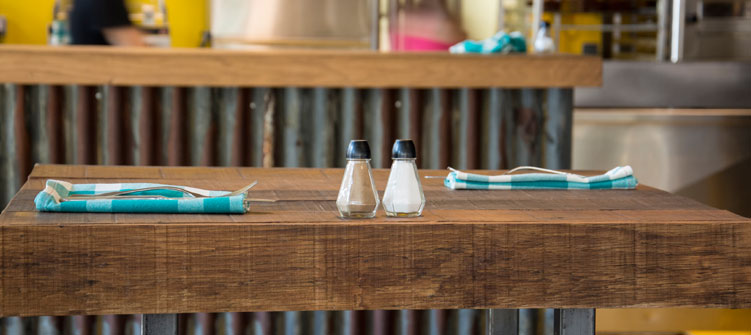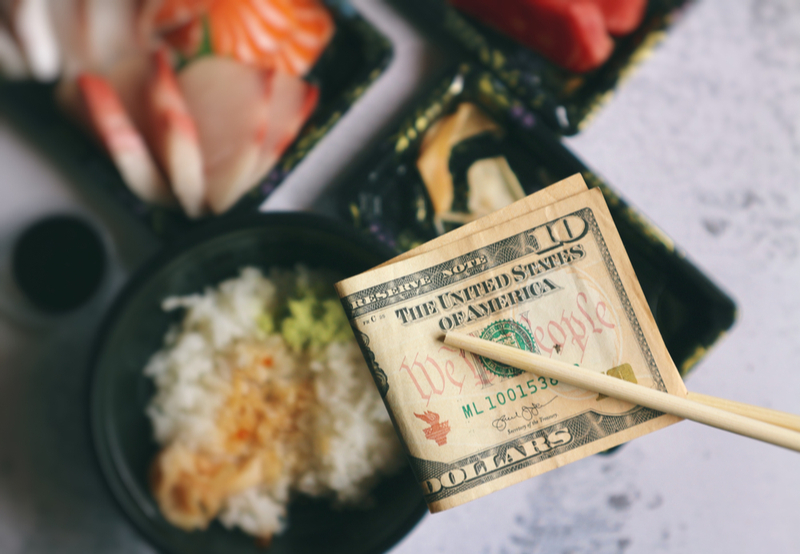
Keeping a restaurant fiscally afloat is one of the toughest jobs in the country. Consider this: about 26% of restaurants fail within their first year, 19% fail in the second year, and 14% in the third year. Even if you manage to survive longer than that, running a restaurant is never smooth sailing. You'll always have to deal with customer retention, off-seasons, competition, and other market pitfalls just waiting to absorb your business. Even when your restaurant is thriving, there's never time to rest your laurels because that's when disaster is sure to strike.
With the odds for success overwhelmingly against you, it seems like bad business to take out a loan for your restaurant since that loan money could end up being the debt that finally strangled your business into oblivion. Or maybe not. The difference could be how hard you plan for your restaurant financing beforehand. So before you turn to a loan, be sure to ask yourself a few fundamental questions.
This is kind of a trick question because if your business desperately needs the money, maybe you shouldn't get the loan. This might be a warning flag that your business is failing, and it's time to jump ship. Accruing more debt might just hurt you more in the end.
On the other hand, if you can survive without the loan, then you might be better off without it, too. Loans almost always come with fees and interest. So if you're on the fence about how much you need the money, then you should definitely ask yourself this next question.

If you need the money to battle an insurmountable amount of debt, then you probably aren't thinking about how you're going to use the money to make money. We're sorry; this is a terrible position to be in.
Hopefully, that's not where you are. Ideally, you have a business plan set out that confidentially puts you in a position to make more than you plan to borrow (even when you factor in the interest and fees).
You might benefit from having another set of eyes look over your business plan. If it makes sense, consider hiring a consultant to make sure the loan will help your company as much as you think it will. They may be able to help tweak your plan, so you earn more money. Or, they may be able to warn you about potential oversights on your part.
Speaking of that plan, if it includes buying new furniture and equipment for your restaurant, you might want to think again.
Experts in the restaurant industry have suggested that used equipment can be a better investment than new equipment. So if you plan on using your restaurant financing to fund a brand new oven, maybe you should buy it second hand instead. You should always consider other options.
That brings us to a major point–is there any chance that you can move some money around and avoid the loan altogether? Or, if you can't, could a financial expert do it? If so, it'd be worth it to hire a consultant.
If you aren't convinced, here's some wiggle room an accountant might be able to find in your current finances:
But even the best consultant won't be able to help you if you haven't been paying attention to your competition, which brings us to our next question.

Never, never take out restaurant financing before you've done some serious market research. Failure to know what the competition is doing is one of the biggest reasons restaurants fail. Yes, you should have a vision that's all your own, but it's foolish not to check and see how that vision compares to your direct competition.
I'm reminded of two burger joints from my hometown. One of them launched a BOGO night one day on Tuesdays. The other restaurant wasn't paying attention, and a couple of weeks later, they launched a campaign of their own. "Buy one get one half off on Tuesdays." The second restaurant poured a serious amount of money into their doomed campaign, advertising it through mailers and whatnot.
It became a joke around town. On Tuesdays, you had to decide if you wanted a free burger or one that was half-off. The restaurant that hadn't been paying attention to their competition had inadvertently branded themselves as a fool.
They survived, but not everyone does when they ignore what their competition is doing.
You'll only succeed with a good marketing campaign. Even if the restaurant funding has nothing to do with advertising, it should. As you plan out your next marketing campaign, remember to play to your strengths and design the ad to appeal to the customers you already know you have and those you want.
This assumes that you know your customers. Many restaurants do not fully understand why their customers choose their restaurant. This is a recipe for disaster since you may be just one shift away from alienating your patrons. Get out there on the floor. Find out what makes those eaters tick. Then, double down on what you're doing right and let the world know about it through advertising.

So, you've answered the above questions and have established that restaurant business loans are a good option. You've drafted a detailed business plan and know your strategy. Now it's time to put that plan into action. There are five types of restaurant funding. Read on to find out which will be most effective for your financing goals.
The SBA is a government agency created to level the playing field for small businesses. They offer several types of small business loans for a restaurant and other companies, as well as financial counseling, training programs, and other resources that may be of use to you even if an SBA loan is not.
The SBA is not a direct lender. Instead, they work with financiers such as banks and credit unions to connect business owners to loans. The SBA guarantees these loans – up to 85% in some cases – as an incentive for financiers to lend to entrepreneurs who would otherwise be ineligible for financing. The SBA makes loans much more accessible to consumers this way.
SBA 7(a) Loan
One popular loan option for restaurant owners is the SBA 7(a) loan. This is the program's flagship loan, and it is useful for business owners in a variety of industries, restaurants included. In fact, most SBA 7(a) loans are awarded to restaurants than any other type of business. Those in food service take out these loans for a variety of reasons, including:
SBA 7(a) loans can also be applied toward a variety of expenses, such as:
To be eligible for this loan, your restaurant must:
SBA 7(a) loans are best for restaurant owners who are not qualified to receive loans elsewhere and who do not need immediate assistance, as these loans can take weeks or even months to be issued.
There is no minimum amount you can borrow in SBA 7(a) loans. However, there is a maximum of $5 million (making the maximum guarantee $4.5 million). The loan is long-term (up to 25 years) and will incur some fees and interest.
To apply for an SBA 7(a) loan, go directly to your bank or credit union. The bank will apply for a guarantee from the SBA. If approved, they may then offer a loan based on the SBA's guarantee. The institution the loan is being offered through will be your point of contact throughout the loan process. You most likely will not have to directly interact with the SBA unless they require you to complete training courses or counseling, which may be the case for some borrowers.
CDC/504 Loan
A less popular option is the CDC/504 Loan Program. This loan can be applied toward many of the same costs as the 7(a) loan. However, it cannot be used to purchase inventory, meaning that if special inventory such as pricey, seasonal items are central to your operations, this may not be the best loan for you. Unlike the 7(a), it also cannot be used for working capital or debt refinancing,
The CDC/504 loan follows the same application procedure as the SBA 7(a) loan and has the same response time (weeks to months). The 504 Program has similar eligibility requirements to the 7(a) loan as well. Eligibility is based on the business' purpose, size, and age, and whether other financing options are available.
Opening a line of credit for your restaurant gives you the flexibility to decide when, how much, and on what you spend your money. This may be useful in situations when business owners need a long-term, continuous cash flow. Lines of credit for restaurant owners work similarly to personal credit; a bank or credit union will approve you for up to a certain amount of credit you can expend per month. A business line of credit may be repaid monthly ot annually, depending on your bank's terms. Once it is repaid, the credit line is renewed, so you can continue to make purchases as you need to. Best of all, there is practically no limit to what you can finance with a line of credit; you can use it for one big purchase or many small purchases.
This may be an excellent option for restaurant owners who do not want to go through the trouble of continually taking out a loan, which they must pay interest and fees on. A business line of credit is a much more sustainable way of keeping your business afloat.
As the name suggests, this type of restaurant business loan is used specifically for purchasing specialized equipment. Suppose you need a new stove, oven, or refrigerator. In this scenario, you have several options. You may choose to buy the equipment from a lender or take out a loan to buy the equipment yourself. You may also decide to rent the equipment instead of buying it. Many business owners take both routes; which you choose depends on your unique situation and needs. However, many restaurant owners find that investing in new equipment is a better deal than leasing. Often, buying equipment upfront is cheaper in the long run, whereas leasing comes with continuous payments and is often more expensive than the equipment itself is worth it.
It's also worth noting that some lenders will finance equipment against collateral such as business, or even personal, assets. While this presents a greater risk to you should you default, using collateral will reduce the overall loan cost. Collateral may also increase your chances of getting approved for financing in the first place, especially if you have damaged credit.
Many successful eateries have used restaurant financing to become more successful. Many more, however, have let an unsecured business loan be the downfall of their livelihood. But we don't need to convince you of the gravity of the situation. You know how significant this loan decision is. We only hope that our suggestions will help you make the right decision and then make more money in the long run. Please reach out if you have any questions about this important choice. If you're ready to request your business financing right now, we can help with that, too.